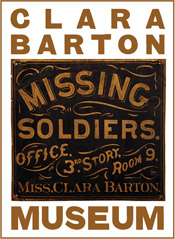



Join us for a discussion of Clara Barton: Civil War Humanitarian
Join us at the Clara Barton Missing Soldiers Office Museum on July 8 from 2PM-3PM for a panel discussion of the latest book from the NMCWM Press: Clara Barton: Civil War Humanitarian. The book is a compiled edition that includes articles by museum staff and colleagues with details on Barton’s relief work during the Civil War and her groundbreaking efforts in the Missing Soldier’s Office.
Several of the contributing authors will be discussing their research for the book and answering questions concerning their findings.
The presentation is included with admission to the Clara Barton Missing Soldiers Office Museum and FREE for NMCWM members.
The Clara Barton Missing Soldiers Office Museum is located at 437 7th St. NW, Washington D.C.
HOURS:
The Clara Barton Missing Soldiers Office Museum is open on Fridays and Saturdays from 11:00 AM – 5:00 PM for walk-ins. All other times, the Museum will be open only to groups of 10+. Click here to reserve a group tour.
Opens at 11:00 AM
Last Admission at 4:30 PM
PHONE:
(202) 824-0613
LOCATION:
437 7th Street NW
Washington, D.C. 20004
Looking for our Mailing Address?
The preserved rooms are accessible by both stairs and elevator.
Admission rates apply.
[She] toiled as few men could have done, stanching wounds which might otherwise have proved fatal, administering cordials to the fainting soldier, cheering those destined to undergo amputation, moistening lips parched with thirst [and closing the eyes of the dead].
The patriot blood of my father was warm in my veins.
I may sometimes be willing to teach for nothing, but if paid at all, I shall never do a man’s work for less than a man’s pay.
I don’t know how long it has been since my ear has been free from the roll of a drum. It is the music I sleep by and I love it.
I ask neither pay or praise, simply a soldier’s fare and the sanction of your Excellency to go and do with my might, whatever my hands can find to do.
Though it is little that one woman can do, still I crave the privilege of doing it.
I only wish I could work to some purpose. I have no right to these easy comfortable days and our poor men suffering and dying thirsting … My lot is too easy and I am sorry for it.
It was a miserable night. There was a sense of impending doom. We knew, everyone knew, that two great armies of 80,000 men were lying there face to face, only waiting for dawn to begin the battle.
When I reached [home], and looked in the mirror, my face was still the color of gunpowder, a deep blue. Oh yes, I went to the front!
